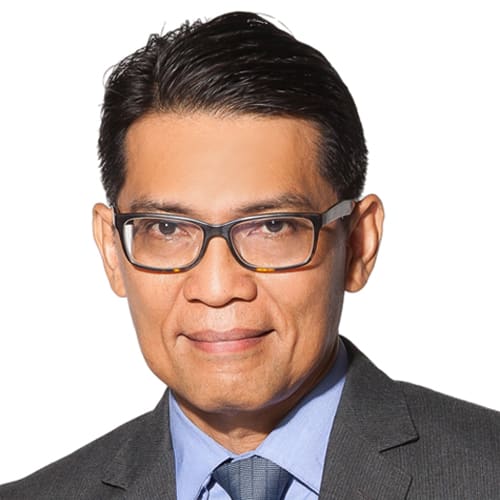Indonesia Elections 2024: ‘Feast for democracy’ as voters turn out despite heavy rain to pick next president, legislators
Voting extended beyond 1pm in some areas across the archipelago’s three time zones for 204.8 million eligible voters. Quick counts are expected a few hours after voting ends.
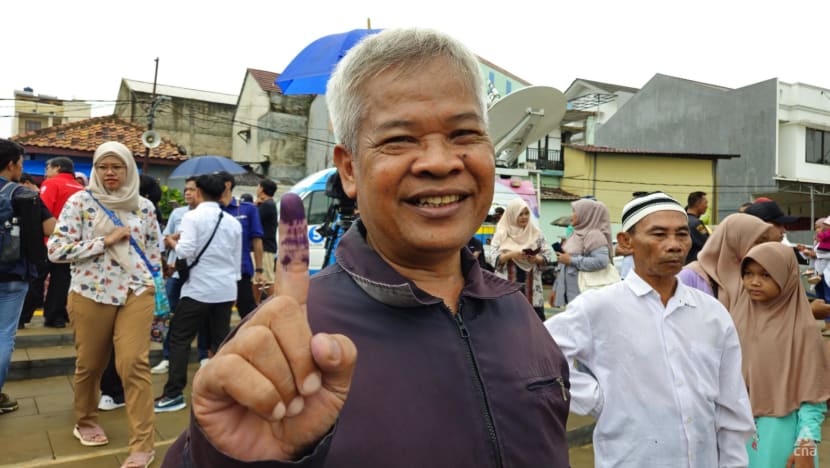
Jakarta voter Imam Khusaeri hopes Indonesia's new president will bring change. (Photo: CNA/Leo Galuh)

This audio is generated by an AI tool.
JAKARTA: Indonesians turned up in force across the archipelago on Wednesday (Feb 14) to pick their next president, vice-president and lawmakers at all administrative levels in an election that has been dubbed the world’s largest to be held in a single day.
Polling stations were scheduled to open at 7am and close at 1pm across three time zones, with quick counts expected to stream in a few hours after voting ends.
But torrential rain caused some voting stations to open behind schedule, and they will operate for six hours, the General Elections Commission (KPU) told CNA.
Flood-hit areas included parts of Java. In Central Java’s Demak Regency, the rain forced voting to be postponed in local villages while in some areas of Central Jakarta, polling was delayed.
But voters who showed up were in high spirits.
In Cilandak district of South Jakarta, Mr Imam Khusaeri, 60, watched as crowds jostled to take selfies with presidential candidate Anies Baswedan after he voted.
Mr Imam, who works as a personal driver, said it was a coincidence that he lived in same area as Mr Anies and was proud to be neighbours with a presidential candidate.
“Every five years, we have a feast for democracy,” he said, referring to the election. “As an elderly person, it is important that we exercise our right to vote to secure the future of the millennial generation.”
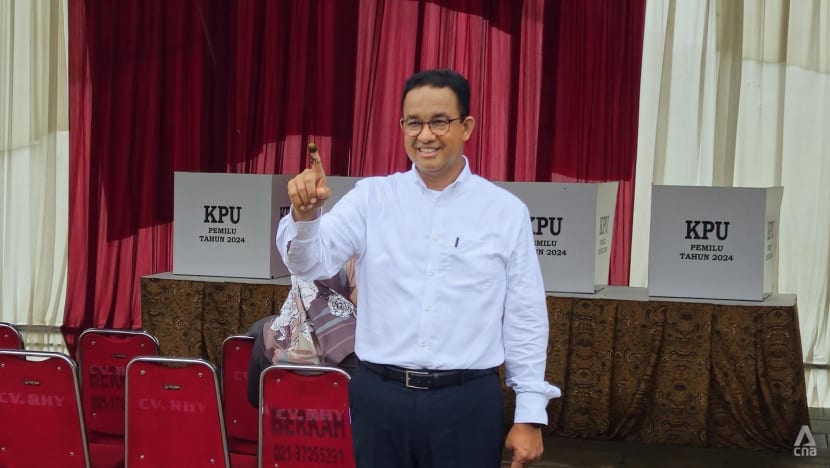
Mr Imam hopes the next president will be fair and continue to bring prosperity to the people. “Seeing change is still the number one priority,” he added.
“I am 90 per cent confident that the candidate I voted for will win in one round. If it goes to two rounds, that’s God’s will,” he declared.
First-time voter Khautsar Noor Alip, 19, took videos as Mr Anies walked past, saying it was “exciting” to play his part in democracy.
“The new president can contribute to Indonesia’s future,” the university student said. “I hope the person I voted for can continue to develop the country.”
Mr Anies' supporters, who came from various parts of Indonesia, gathered at his residence in Lebak Bulus, South Jakarta, after voting. "This is what makes us feel that this is a blessed campaign, they move voluntarily and genuinely. It's amazing," the former Jakarta governor said.
At a polling station in Kebagusan district, South Jakarta, 60-year-old retiree Marta, who goes by one name, told CNA: “I want a leader who is nice, who can understand the people and take care of the people.”
He arrived at the polling station at 9am and the voting process went smoothly, he added. Mr Marta voted at the same polling station as chairwoman of the Indonesian Democratic Party of Struggle (PDIP) Megawati Soekarnoputri.
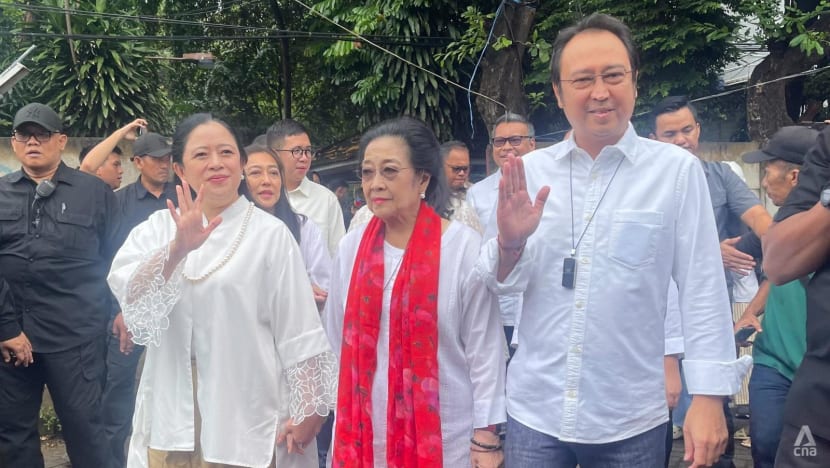
PDIP’s presidential candidate, Mr Ganjar Pranowo, cast his vote at around 8.30am in Semarang, Central Java.
“Yes, we are waiting (for the results)," he said, expressing readiness to accept the outcome. "To me, whether we win or they lose, it’s the same."
The third presidential candidate, defence minister Prabowo Subianto, cast his vote in Hambalang, West Java, a few kilometres from his villa.
“The rain has brought blessings, the rain has brought fortune. So we ought to be grateful. Hopefully, everything will proceed smoothly, God willing,” he told reporters.
Mr Prabowo’s campaign team said he may visit several places in Jakarta, some 50km away from Hambalang, later in the day to meet volunteers who are monitoring the results of the election.
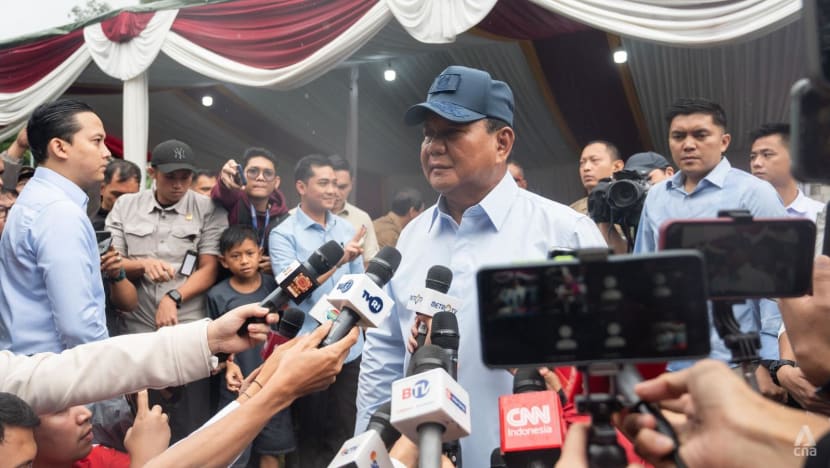
The KPU extended balloting hours to accommodate voters affected by bad weather.
KPU commissioner Yulianto Sudrajat said some polling stations had to open several hours behind schedule while other polls had to switch locations entirely. “The polls are supposed to be opened for six hours. So if a polling station can only start at 9am, it will stay open until 3pm. Election officials will accommodate voters who come during this time until everyone has exercised their rights,” Mr Yulianto said.
The KPU has 30 days to release official results and, in previous elections, these were announced at least a week after polling.
Indonesia is Southeast Asia’s biggest economy and it sits on the Straits of Malacca, one of the world’s most important trade arteries, in a region considered ground zero for United States-China rivalry.
The country has also banned raw nickel exports – one of the world’s most in-demand metals and crucial for electric vehicle batteries – under President Joko Widodo’s policy of developing local processing streams.
Whether the new president will change this policy, and how he might alter relations with the US and China will be keenly watched.
Pollsters say the clear frontrunners for president and vice-president are Mr Prabowo and Mr Gibran Rakabuming Raka, who is Mr Widodo's son. A Feb 9 Indikator Politik Indonesia opinion survey put their electability at 51.8 per cent.
In second place are Mr Anies and Mr Muhaimin Iskandar (24.1 per cent), with Mr Ganjar and Mr Mahfud MD in third (19.6 per cent).
The rules require a candidate to win at least 50 per cent of the national vote to avoid a runoff, which will see the first- and second-placed candidates go head-to-head in polls set for Jun 26.
With slightly more than half of eligible voters aged between 17 and 40, the youth vote will significantly influence the election. These voters are invested in diverse issues ranging from cost of living to climate change and inclusivity to corruption.
The days leading up to polling were plagued with allegations of undemocratic manoeuvres and electoral fraud.
Mr Widodo, who is constitutionally barred from a third term, has been accused of mobilising state apparatus and aid to push for Mr Prabowo and Mr Gibran to win in one round.
Mr Widodo, also known as Jokowi, has thrown his weight behind the Prabowo-Gibran ticket in a bid to cement his legacy, sparking criticism that he was crafting a political dynasty.
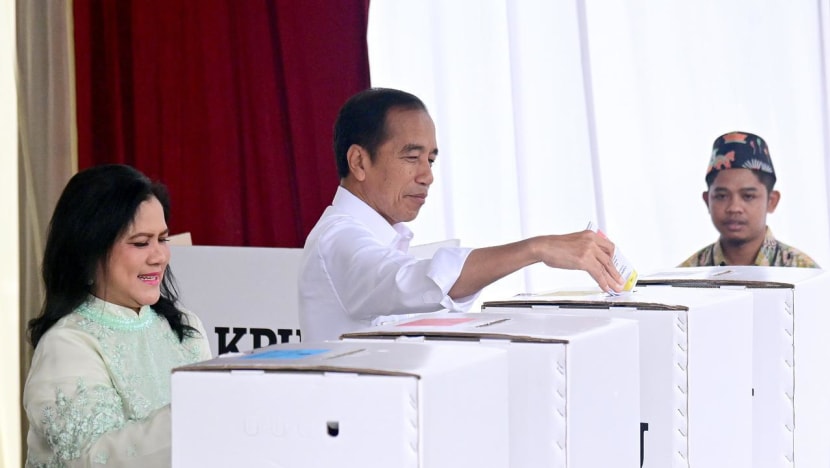
A documentary released on the first day of cooling-off – which ran from Sunday to Tuesday – alleged that “political instruments of power” were being used to rig the election, stoking public anger and a fierce rebuttal from Mr Prabowo’s campaign team, which dismissed the film as slanderous.
According to a Feb 10 report by The Intercept, army and intelligence officials have prepared a plan to use police and “babinsas” – the army’s eyes, ears and hands at the neighbourhood level – to receive and distribute money to fix precinct-level tabulation sheets.
If the official results show Prabowo-Gibran winning in one round by only a slim majority, these allegations are expected to grow even louder, with legal challenges launched.
Mr Prabowo is a former general accused of past human rights abuses and has twice failed to become president. He lost in the 2014 and 2019 elections to Jokowi.
But ties between the two have warmed as Mr Prabowo has promised to continue Jokowi’s policies. He has also rehabilitated his image to some extent, and has recently been compared to a cute grandfather.
The challenger most likely to force a runoff is Mr Anies, the former Jakarta governor who has been critical of Jokowi and his policies and has campaigned for change. If the election goes to a runoff, observers expect he will try wooing anti-Prabowo supporters from Mr Ganjar’s camp.
The months before the potential June runoff will also likely involve behind-the-scenes horse trading among the political elites, with the leading candidate expected to dangle concessions and positions to parties that supported the third-placed candidate.
The new president and vice-president will be sworn in on Oct 20.











